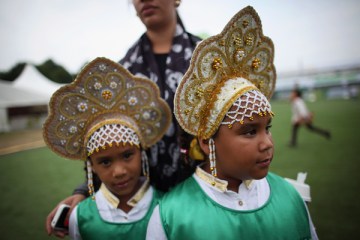A chef from the Michelin-starred Mosimann's restaurant walks through the "Bernese Chalet" inside the House of Switzerland complex near London Bridge on July 19, 2012.
Waitresses walk past in Swiss lederhosen. ‘Carbivores’ chow down on traditional Swiss potato cakes. And images on the walls depict trains climbing the Alps in the Bernese Oberland. But this isn’t a scene from a Swiss tourism pamphlet. It’s a typical afternoon in a converted English pub—normally known as the Mudlark—a few meters from the London Bridge Tube Station.
The pop-up restaurant, known as the “Bernese Chalet,” is just one part of the House of Switzerland, a sprawling, 3,000-square-meter complex open to the public until the end of the Paralympic Games on September 9th. A four-story building at the center of the complex houses a private lounge for Swiss athletes, a room of video games designed by Swiss firms, and a coffee bar that turns into a disco called “Le Club.” Outside, a make-shift market square includes a live stage, where Swiss musicians and pop stars perform every evening, and a climbing wall sponsored by Mammut, the Swiss company known for its mountain climbing equipment.
It’s all meant to give the neutral European nation a PR boost during the Olympic games. “If you look at studies that we’ve conducted in Britain, we know that Brits love us,” says Nicolas Bideau, the head of the Swiss government’s public diplomacy unit. “But they also consider us a bit closed, selfish and not very sympathetic or creative. This is exactly what the House is fighting against.”
Switzerland isn’t alone with its branding exercise. At least 18 foreign governments have rented buildings and erected pavillions hoping to showcase their culture and potential business opportunities during the Olympics. The Czech House, open daily from 10am until midnight, offers guests plenty of Czech dumplings and the opportunity to purchase the official Czech Olympic uniforms. There’s also a mechanical installation of a London bus from famed Czech artist David Cerny. It does push-ups and has human buttocks. The Dutch House, which has earned a reputation over the past two decades for late-night revelry, is sponsored by Heineken and closes at 2am. Given the clubby atmosphere, no one under 18 is allowed in unaccompanied after 8pm.

Dan Kitwood / Getty Images
Bigger countries hope to benefit too. Russia, which will host the winter Olympic games in Sochi in two years, sees putting on a good show as a way of boosting anticipation of its forthcoming games. “Everybody recongnizes that the modern Olympic games are the most recongnized and successful non-commercial brand in the world,” says Dmitry Chernyshenko, chief executive of the Sochi 2014 Winter Olympics. So his team has set up Russia Park and Sochi Park—two massive pavillions inside London’s Hyde Park.
The latter includes a nightly ice skating spectacular that stars six Olympic champions and 18 world champions — all of them Russian. In one of the more camp moments of the show, 2002 Olympic figure skating champion Aleksey Yagudin does spins in front of a digitized roulette wheel while a series of skaters dressed as dice and playing cards twirl around him. Before entering the ice skating arena, visitors, who have forked out $30 each for tickets, must pass through a series of rooms that feature virtual reality bobsled rides. At the start of the tour, Tatiana Navka, an Olympic champion ice dancer, appears on a floor-to-ceiling projection. “We have the energy for growth and celebrate the opportunity for positive transformation,” she says. “That’s my Russia!”
For Switzerland, which doesn’t exactly have a blemished human rights record, there’s less need to hit guests over the head with glitz and glamour and overt posturing. So the Swiss organizers, who have a budget of $4.6 million, opted to showcase the quirky. Visitors compete in traditional Swiss sports—like cheese rolling and alpine horn blowing—in the market square adjacent to the house. And a recent concert included Swiss pop act Boy, a group made up of two girls. They celebrate their country’s better-known exports, too. Among the most popular stalls is from the chocolate gurus at Lindor. “It’s a massive draw,” says chocolatier Dean Turner. “It brings lots of city people in, and they get to taste something quintessentially Swiss.”
Best of all, the House of Switzerland is free. “We want everyone to enter, ” says Bideau. “We’re an open house. We’re an open country.”

